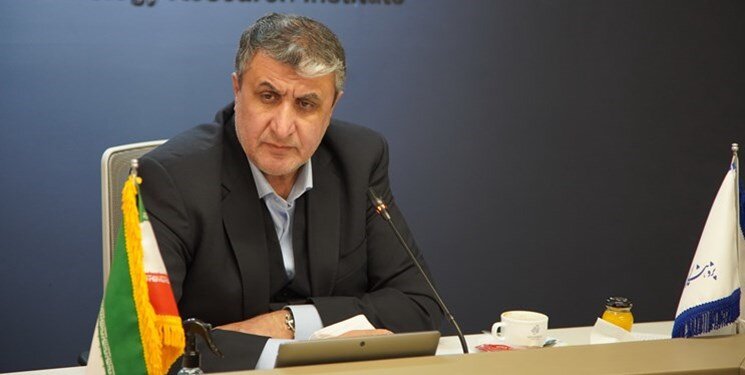Iran acquired modern technology despite destructive attempts of enemies: AEOI chief

TEHRAN – Iran’s top nuclear official has said that the country succeeded in obtaining modern technology despite destructive efforts by the enemies.
Mohammad Eslami, the head of the Atomic Energy Organization of Iran (AEOI), said that the Islamic Republic of Iran has acquired modern technology without the help of other countries and despite all the obstacles and destructive attempts made by the enemies.
In his speech on Friday evening, during a ceremony held to commemorate the martyrs in the city of Kashan in Isfahan province in central Iran, Eslami made a reference to U.S. sanctions imposed on Iran and said, “The Islamic Republic of Iran will not compromise the independence of the pride and interests of the country.”
He considered that the sanctions process consists of two parts and is not only economic, explaining that the main issue for them (the Europeans) behind the sanctions is to force the Islamic Republic to move towards submission, cessation, disarmament and occupation, and this path is the goal of global arrogance, Fars News reported.
The Assistant to the President of the Islamic Republic affirmed that the Islamic Republic is hard to surrender and said, “The sanctions did not lead to the surrender of the Islamic Republic of Iran, but rather became a factor in its power, thanks to God.”
He stressed that the Islamic Republic of Iran must meet its needs by relying on its experts and scientists, and said, “Iran is now at the beginning of the road in nuclear technology, and this knowledge will create many capabilities that will be highly effective for the current and future generations.”
He considered that any country that has modern technology is a strong country and said, “Today, the Islamic Republic of Iran, without receiving help from other countries, and despite all the obstacles and sabotage acts that were carried out by the enemies, has become the owner of this technology and has come out of the domination of global arrogance.”
He stated that the enemies cannot stand the Islamic Republic of Iran's possession of modern technology and are seeking to stop its movement by making accusations against it. He added, ‘The enemies, by directing various kinds of accusations against Iran, want to suggest that the nuclear file contains a deviation, and these accusations are in fact false.”
He referred to the duplicity of enemies regarding the Iranian nuclear file, and said, “The Zionist entity says that Iran's nuclear program must be destroyed by military action, but some European countries believe that without military action, Iran's nuclear technology must be curbed and Iran's access to nuclear weapons must be prevented, because Iran's nuclear program has become endemic and internal and cannot be erased and destroyed by bombing.”
He added, “The enemies believe that Iran has an effective leadership, and if it reaches advanced and equipped technology, benefits and economic power, no one will be able to confront it.”
He said, “For many years, enemies have been trying to fabricate a file against the Islamic Republic of Iran by creating a negative atmosphere and producing fake news and false accusations, so that they can impose sanctions on Iran.”
Earlier, Eslami reacted to Western allegations that Iran has dropped a demand for the International Atomic Energy Agency to end its probe. The IAEA’s investigation into Iran’s alleged past nuclear activities has been a major source of contention in the talks in Vienna over reviving the 2015 Iran nuclear deal, officially known as the Joint Comprehensive Plan of Action (JCPOA). The IAEA claims that it found uranium particles in a number of “undeclared” sites in Iran. It presented Iran with a set of questions on the sites. Iran provided answers but the IAEA keeps insisting that the Iranian answers are not technically credible.
On the other hand, Iran said the IAEA has moved away from its mandate by pursuing unfounded allegations propagated by Israel, a staunch opponent of the JCPOA. Iran said the IAEA, in its dealings with Iran, has not been technical and its behavior is politically motivated.
Eslami said Wednesday that reviving the JCPOA is now dependent on how the IAEA tackles its probe.
He reiterated that if the IAEA does not close its probe, there will be no such thing as “Reimplementation Day,” a stage in the process of reviving the JCPOA that would come nearly four months after the start of the process.
Commenting on the Western reports that Iran dropped its demand for closure of the IAEA probe, Eslami told ISNA, “What we have written [to the West] is decisive. Our intention and emphasis are that if these questions are not closed by the Reimplementation Day, there will be no Reimplementation Day. We did not back down and we cannot back down.”
Leave a Comment